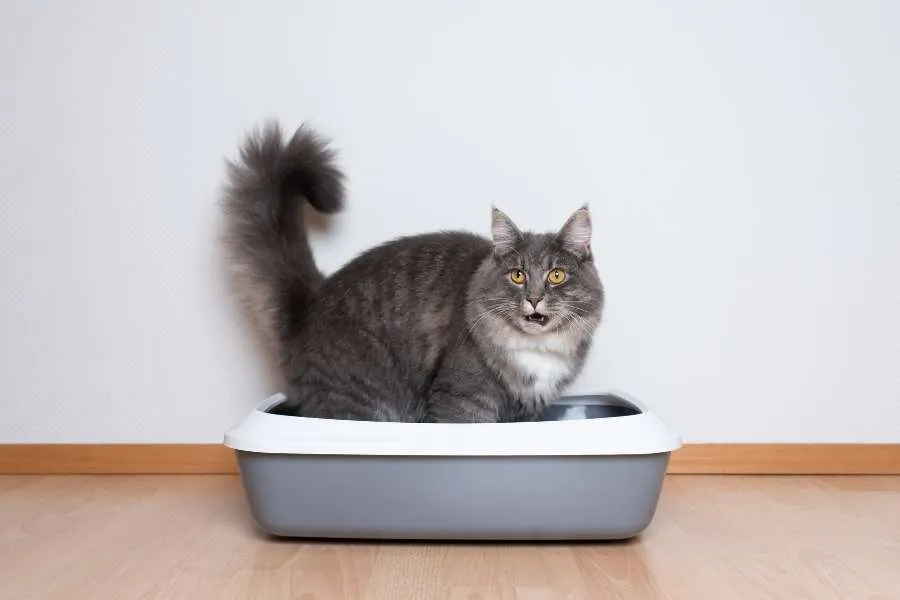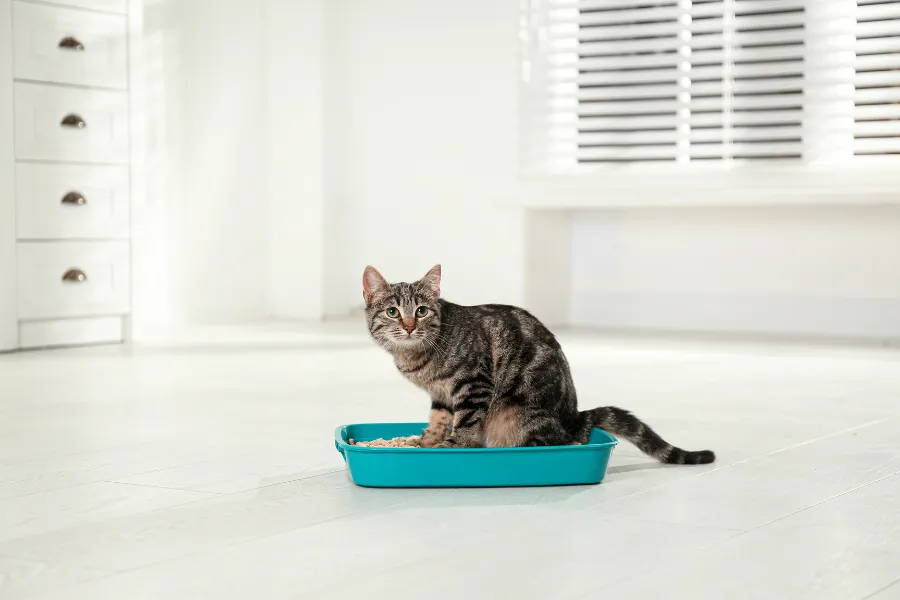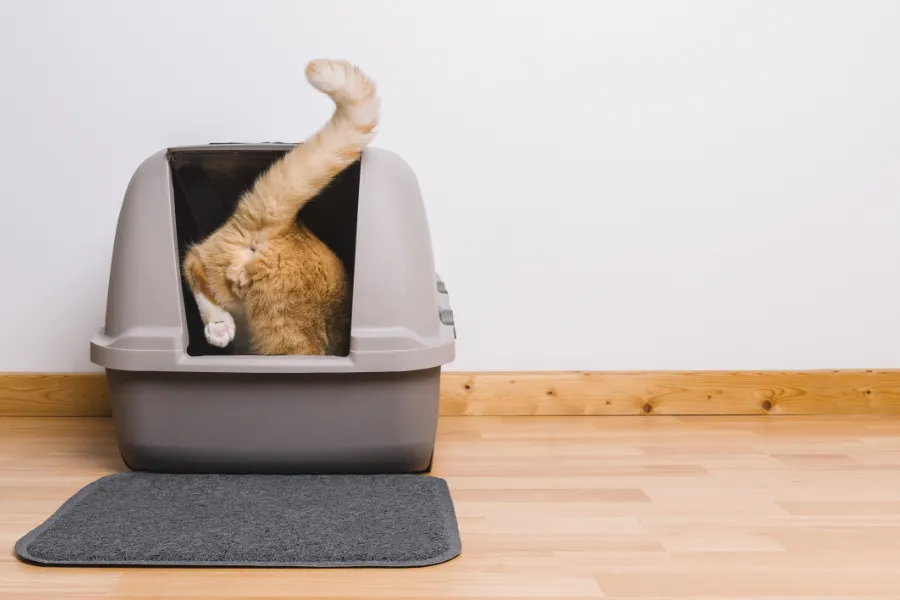Ever wondered why your cat meows after using the litter box? This puzzling behavior of feline friends is more common than you might think. In this comprehensive guide, we’ll delve into the possible reasons behind such vocal expressions and offer solutions to ensure your pet’s comfort and well-being.
Ready to decode your cat’s communication? Let’s get started!
Key Takeaways
- Cats may meow after using the litter box to communicate their needs, such as notifying their owners of elimination, requesting a clean litter box, expressing discomfort with the current litter box setup, seeking attention or rewards, and asking for assistance.
- Meowing after using the litter box can indicate potential health issues in cats, including diarrhea, urinary tract infections (UTIs), cystitis (bladder inflammation), blockages in the urinary or digestive tract, and arthritis. It’s important to recognize these signs and seek veterinary assistance if necessary.
- Choosing the right litter is crucial to prevent cats from peeing outside the box and reduce litter tracking. Look for highly absorbent litter with a fine-grained texture that mirrors natural sand, consider options with added odor control, and choose litters that create minimal dust.
Understanding Cat Behavior: Cat Meows After Using the Litter Box
Cats are creatures of habit and masters of non-verbal communication. However, a unique trait that stands out is their tendency to meow after actively using the litter box. It’s essential for cat owners to interpret this behavior accurately since it could manifest due to various factors.
Sometimes cats might communicate the completion of an elimination cycle or even signal pain.
Observing your feline companion’s reaction post-elimination can provide substantial insights into its well-being and comfort levels with space provided for toileting purposes. For example, suppose your cat meows after using litter box. In that case, it may be voicing dissatisfaction with the state of the litter tray or discomfort from urinary issues such as Urinary Tract Infection (UTI) or Cystitis.
On a lighter note, some cats seek attention by creating noise; they may have learned that meowing gets them immediate human interaction or a treat! But more critical cues shouldn’t be overlooked – excessive howling can indicate medical conditions like arthritis causing physical distress in older felines during bowel movements.
Common Reasons for Meowing After Using the Litter Box
Cats meow after using the litter box to communicate their needs, such as notifying their owners of elimination, requesting a clean litter box, expressing discomfort with the current litter box setup, seeking attention or rewards, and asking for assistance.
Notification of Elimination
Cats are sophisticated creatures with a unique way of communicating their needs. A common behavioral trait in felines is meowing after using the litter box, often viewed as a notification of elimination.
This behavior can be traced back to their wild ancestry, where making noise was an effective approach to keep potential predators away from their territory.
The sound serves dual purposes: first, it alerts you that your cat has done its business, and second, it signals any other pets in the house about the recent litter box use. It’s like they’re saying, “Hey there! I’ve just used the restroom.” Your furry friend might also engage in this announcement to stress establishing or asserting dominance within multi-cat households.
This elimination ‘alert’ system works wonders, especially for feline parents who need that extra reminder about cleaning up after their pet’s bowel movement.
Request for Litter Box Cleaning
Cats are keen on cleanliness and demand a tidy environment for their bathroom routines. After using the litter box, a cat’s meow may carry an urgent message to its owner – it’s time for cleaning! Cats can associate an unclean litter box with discomfort, causing them to vocalize their dissatisfaction post-elimination.
Your feline friend’s displeasure could be due to insufficient or excessive litter, tray abnormalities, or simply an overload of waste that hasn’t been cleaned in ages. So don’t ignore your pet’s call for action; maintaining a clean litter box contributes significantly to your cat’s wellness and helps avoid undesirable behaviors like peeing outside the box.
Regularly scooping out soiled clumps from the litter tray and routinely changing out all the litter stays paramount in keeping your cat happy and healthy.
Discomfort or Dissatisfaction with Litter Box
Some cats may meow after using the litter box if they are experiencing discomfort or dissatisfaction with their litter box. This could be due to various reasons, such as the size, style, location, or type of litter in the box.
For instance, if the litter box is too small to comfortably move around or dig in, they may vocalize their displeasure. Similarly, if the litter is not to their liking in terms of texture or scent, they might express their dissatisfaction through meowing.
Cat owners must consider these cues and consider adjusting to ensure they feel comfortable and satisfied with their toileting area.
Seeking Reward or Attention
Cats are highly intelligent and intuitive creatures, often using their vocalizations to communicate their needs. One common reason for a cat meowing after using the litter box is to seek reward or attention from their human companions.
Cats trained or conditioned to expect treats or rewards after elimination may vocalize as a way of reminding their owners to fulfill this expectation. This behavior can also be seen in cats that simply enjoy the positive reinforcement and interaction they receive when they meow after using the litter box.
It’s important for cat owners to understand that this behavior is normal and may not necessarily indicate any underlying issues; rather, it showcases the unique bond between felines and human companionship.
Requesting Assistance
Cat meows after using litter box to request assistance from their owners. Sometimes, cats can encounter difficulties when trying to eliminate, such as constipation or struggling with bowel movements.
When this happens, they may vocalize their discomfort, hoping their humans will help. Cat owners need to pay attention to these meows and observe if there are any other signs of distress or physical abnormalities during elimination.
Seeking veterinary assistance promptly can help address underlying health problems and ensure your furry friend receives the necessary care and treatment.

The Frequency of Cat Urination: How Many Times Does a Cat Pee a Day?
– On average, cats urinate between 2-4 times per day.
– The frequency of cat urination can vary depending on age, diet, hydration levels, and overall health.
– Kittens tend to urinate more frequently than adult cats, often relieving themselves after each meal or play session.
– Adult cats typically maintain a consistent pattern of urinating 2-3 times per day.
– Older cats may experience changes in urinary patterns due to age-related conditions such as decreased bladder control or kidney function.
– Cats with certain health issues like diabetes or urinary tract infections may also have increased frequency of urination.
Potential Health Issues Indicated by Meowing
Cats meowing after using the litter box can indicate potential health issues. From urinary tract infections (UTIs) to blockages and arthritis, understanding these indicators is crucial for your cat’s well-being.
Read more to ensure you recognize any red flags early on.
Diarrhea
Diarrhea is a common cause of cats meowing after using the litter box and can be quite uncomfortable for them. It is usually caused by a change in diet or consuming something that doesn’t agree with their stomach, such as spoiled food or plants.
Diarrhea can also occur if your cat has allergies to certain ingredients in their food. This condition can make them meow loudly after pooping as they try to communicate their discomfort.
It’s important to monitor your cat’s stool consistency and seek veterinary attention if diarrhea persists or worsens, as it could indicate an underlying health issue that needs to be addressed promptly.
Urinary Tract Infection
Urinary tract infections (UTIs) in cats can cause them to meow loudly after using the litter box. UTIs are painful and uncomfortable for cats, making them vocalize their distress. These infections occur when bacteria enter the urinary tract, causing inflammation and irritation.
Factors such as a weakened immune system, inadequate hydration, or certain medications can increase the risk of UTIs in cats.
Symptoms of UTIs include frequent urination, straining during urination, and blood in the urine. If your cat is meowing after using the litter box and displaying these symptoms, it’s important to consult a veterinarian for proper diagnosis and treatment.
Antibiotics are often prescribed to treat UTIs in cats.
Preventing UTIs involves maintaining good hygiene by regularly cleaning the litter box and providing fresh drinking water for your feline friend. Ensuring that your cat stays hydrated helps flush out any potential bacteria from their urinary system.
Cystitis
Cystitis is a common condition in cats that can often be the cause of their meowing after using the litter box. It refers to bladder inflammation or irritation, typically caused by stress.
This can lead to discomfort and pain during urination, prompting cats to vocalize their distress. In addition to meowing, other symptoms of cystitis may include:
- Frequent urination.
- Straining in the litter box.
- Blood in the urine.
- Even inappropriate elimination outside the litter box.
If you notice these signs in your cat, it’s important to consult a vet who can diagnose and provide appropriate treatment.
Blockages
Blockages in the urinary or digestive tract can be serious and potentially life-threatening for cats. When blockages occur, they can cause cats to meow loudly after using the litter box.
These blockages can be caused by various factors, such as urinary crystals, hairballs, or gastrointestinal obstructions. It is important to seek veterinary intervention immediately if you notice your cat meowing excessively after using the litter box, as blockages require prompt medical attention.
Untreated blockages can lead to severe health complications and discomfort for your furry friend, so it’s crucial to address this issue promptly with professional help.
Arthritis
Arthritis is a common condition among older cats that can cause them to meow loudly after using the litter box. This painful inflammation and stiffness in their joints make it difficult for them to navigate the litter box comfortably.
As a result, they may yowl before and after elimination to express their discomfort. To help alleviate their pain, there are litter boxes specifically designed for senior cats that provide easier access and reduce strain on their joints.
By understanding arthritis as a potential cause of cat meowing after using the litter box, we can take appropriate steps to ensure our furry friends’ comfort and well-being.

Choosing the Right Litter: Addressing Issues of Cats Peeing Outside the Box and Reducing Litter Tracking
Selecting the appropriate litter plays a crucial role in preventing your cat from peeing outside the box and reducing litter tracking around your home. Here are some crucial considerations:
– Look for cat litter that is highly absorbent. This helps to control odor, a critical factor considering that cats might refuse to use a litter box if it smells bad.
– Choose cat litter with the right texture. Cats generally prefer fine-grained litters that mirror the sand they would naturally use in the wild.
– Consider using a litter with added odor control. This can help keep the litter box fresh, which encourages cats to use it.
– Opt for a litter that creates minimal dust. Dust can lead to respiratory issues in both cats and humans.
– Decide on a litter that is track-resistant. Some litters are designed to minimize tracking, keeping your home cleaner.
– Use a litter that your cat prefers. If your cat is not happy with the current litter, they may start peeing outside of their litter box, communicating dissatisfaction.
– Keep in mind that some cats may have specific needs, such as cats with arthritis who may need softer litters.
– If your cat is meowing after using the litter box, consider whether the type of litter might be causing discomfort or dissatisfaction.
The Benefits of Sifting Litter Box for Pine Pellets
Sifting litter boxes that use pine pellets offers several benefits for both cats and their owners.
– Pine pellets are highly absorbent, helping to control odors and keep the litter box fresh for longer periods.
– Sifting systems make it easier to clean the litter box by separating soiled pellets from clean ones, reducing the need for complete litter changes.
– The sifting process helps remove clumps and solid waste efficiently, ensuring a cleaner environment for your cat.
– Pine pellets are environmentally friendly since they are made from compressed sawdust, a renewable resource.
– These types of litter boxes reduce dust compared to traditional clay litter, providing a healthier and cleaner atmosphere in your home.
– Cats often prefer the natural scent of pine over other artificial fragrances commonly found in commercial litters.
– Using pine pellet-based litter can also be cost-effective since you only need to replace soiled or used pellets instead of completely changing all the litter.
Overall, using a sifting litter box with pine pellets can simplify maintenance while keeping your cat’s toileting area hygienic and comfortable.

Behavioral Issues and Cat Meowing
Behavioral issues can contribute to excessive cat meowing after using the litter box, with stress and boredom being common triggers.
Stress and Boredom
Stress and boredom can also contribute to cats meowing after using the litter box. Cats are known for their need for mental stimulation and environmental enrichment; when they don’t have enough, they can become stressed or bored.
This may lead to excessive vocalization, including meowing after using the litter box. To alleviate this behavior, it’s important to provide your cat with plenty of playtime, interactive toys, scratching posts, and cozy hiding spots.
Creating a stimulating environment will help keep your cat mentally engaged and reduce any stress or boredom that may be causing them to meow excessively.
Attention-Seeking Behavior
Cats are notorious attention-seekers, and meowing after using the litter box is often their way of vying for extra love and affection. Whether they’re just seeking more attention or feeling lonely, cats will use their vocalizations to let you know they crave your company.
This behavior can be especially prevalent in oriental breeds like Siamese or Bengals, which are known for their loud and expressive meows. So if your furry friend starts demanding attention after doing their business in the litter box, it’s likely their way of saying, “Hey, don’t forget about me!”.
When to Consult a Vet
Suppose your cat is meowing excessively after using the litter box, showing noticeable changes in behavior, or experiencing physical symptoms such as blood in the urine or straining during elimination. In that case, it’s crucial to consult a vet immediately.
Unusual or Excessive Meowing
Unusual or excessive meowing after a cat uses the litter box can cause concern. While it’s normal for cats to meow after elimination to communicate with their owners, persistent and excessive meowing may indicate an underlying issue.
If your cat suddenly starts meowing excessively after using the litter box, it could be a sign of pain or discomfort. This could be related to urinary tract infections (UTIs), cystitis, digestive or urinary tract blockages, or even arthritis.
It’s important not to ignore these signs and consult a vet if you notice any unusual or excessive meowing from your feline friend.
Noticeable Changes in Behavior
If you notice noticeable changes in your cat’s behavior, such as increased meowing after using the litter box, it could be a sign that something is amiss. Cats are creatures of habit, and sudden shifts in their routines or behaviors should not be ignored.
Paying attention to these changes is important as they may indicate underlying health issues or discomfort. For example, if your cat starts meowing more frequently than before or appears restless and agitated after using the litter box, it could signal urinary tract infections (UTIs), cystitis, or even arthritis in older cats.
These conditions can cause pain and discomfort during elimination and require veterinary attention for proper diagnosis and treatment. So always stay vigilant and consult a vet if you observe any unusual or concerning changes in your cat’s behavior.
Physical Symptoms Accompanying Meowing
Physical symptoms accompanying meowing after using the litter box can indicate potential cat health issues. Diarrhea, which is loose or watery stools, is a common symptom that may accompany meowing.
Various factors, such as dietary changes or allergies, can cause this. Urinary tract infections (UTIs) and cystitis, and inflammation of the bladder, are also possible causes of meowing after using the litter box.
These conditions can cause discomfort and pain during urination, leading to excessive vocalization. Blockages in the urinary or digestive tract may also result in loud meowing after elimination and require immediate veterinary attention.
Conclusion
In conclusion, if your cat is meowing after using the litter box, paying attention to their behavior and understanding their needs is important. It could be a simple request for cleaning or a sign of underlying health issues such as urinary tract infections or arthritis.
By addressing these concerns and ensuring a clean and comfortable litter box environment, you can promote your cat’s well-being and prevent potential problems in the future.
